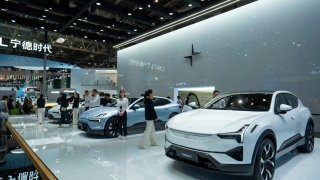On EVs, Israel May Have to Choose Between China and the United States
As Chinese electric vehicles become more prevalent in Israel, the risks they pose to data privacy and national security will grow.
In 2024, the Israeli Ministry of Defense plans to issue a tender for equipping vehicles for officers, expected to include around 9,500 leasing vehicles, with an option to convert up to 20 percent of the fleet to EVs. A notable addition to this tender is a new requirement for car importers to safeguard the security of data collected from modern, network-connected vehicles, which encompasses location and mileage information. Importers must also agree to limit multimedia systems’ connectivity, data collection capabilities, and other smart components, such as internal and peripheral cameras, and prevent data transmission to servers outside the country. Participants will be required to monitor software updates sent from manufacturers' servers abroad to the vehicles through OTA components (modems used for downloading software updates), which are incorporated in many models. This limitation on data flow could pose significant challenges for Chinese EV manufacturers, who typically maintain substantial connectivity to overseas servers.
Nevertheless, as Chinese electric vehicles become more prevalent in Israel, the risks they pose to data privacy and national security will grow. These cases highlight the need for countries in the West to protect themselves from these risks. This could include banning or restricting Chinese smart electric vehicles or requiring manufacturers to ensure that their cars do not collect or transmit sensitive data.
Forced to Choose
Chinese EV manufacturers are rapidly gaining ground in the Israeli market, posing opportunities and challenges. This trend is driven by various factors, including China’s ambition to dominate the global high-tech sector. Investing in the Israeli EV market, known for its technological advancements and innovation, provides Chinese manufacturers access to cutting-edge technology and is a strategic pathway to the European market. This success offers valuable insights into the global EV market and U.S.-China rivalry. The U.S.-China rivalry is reshaping the global technological landscape, with the EV market becoming a crucial battleground. Washington’s restrictions create challenges for allies like Israel, who will face pressure to choose between China and the United States. Israel might face increasing pressure from the United States to limit China’s involvement in the EV market.
Dr. Mordechai Chaziza is a senior lecturer at the Department of Politics and Governance and the Multidisciplinary Studies in Social Science division at Ashkelon Academic College (Israel) and a Research Fellow at the Asian Studies Department, University of Haifa, specializing in Chinese foreign and strategic relations.
Image: Tada Images / Shutterstock.com.

